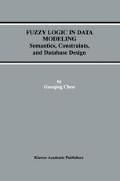Abstract
As mentioned in Chapter 2, the enhanced entity-relationship (EER) model has largely enriched the usefulness and expressiveness of the ER model by introducing the concepts such as subclass and superclass, generalization and specialization, shared subclass and category, attribute inheritance, etc., as conceptual model constructs (Dos Santos, et al., 1979; Scheuermann, et al., 1979; Elmasri, et al., 1985; Teorey, et al., 1986; Gogolla, et al., 1991). Further, these constructs can also be extended using fuzzy logic to account for the conceptual-level uncertainty and imprecision due to fuzziness inherent in corresponding semantics (Kerre and Chen, 1995; Chen and Kerre, 1998). In this chapter, we will discuss fuzzy extensions to the EER concepts around the notion of subclass and superclass. In section 5.1, fuzzy subclass and superclass are described. In section 5.2, a pair of dual concepts related to subclass and superclass, namely, specialization and generalization, are fuzzified. Particular attention is paid to the attribute-defined specialization and generalization. Section 5.3 describes fuzzy extensions to the concepts of shared subclass and category, which is another pair of concepts related to subclass and superclass. Finally, in section 5.4, the issues of inheritance are addressed, including the inheritance of attributes and relationships.
Access this chapter
Tax calculation will be finalised at checkout
Purchases are for personal use only
Preview
Unable to display preview. Download preview PDF.
References
Chen GQ, Kerne EE. Extending ER/EER concept towards fuzzy conceptual data modeling. Proceedings of IEEE World Congress WCCr98 (FUZZ-IEEE’98), Alaska, 1998.
Dos Santos C., Neuhold E., Furtado A. A data type approach to the entity-relationship model. Proceedings of ER Conference’79 1979.
Elmasri R, Weeldreyer J, Hevner A. The category concept: an extension to the entity-relationship model. International Journal on Data and Knowledge Engineering 1985;1:1.
Gogolla M, Hohenstein U. Towards a semantic view of an extended entity-relationship model. TODS 1991; 16:3.
Kerre, Etienne E.; Chen, Guoqing. “An Overview of Fuzzy Data Models.” In Studies in Fuzziness: Fuzziness in Database Management Systems. P. Bosc and J. Kacprzyk, eds. Physica-Verlag, 1995.
Scheuermann P, Schiffner G, Weber H. Abstraction capabilities and invariant properties modeling within the entity-relationship approach. Proceedings of ER Conference’79 1979.
Teorey T, Yang D, Fry J. A logical design methodology for relational databases using the extended entity-relationship model. ACM Computing Survey 1986; 18:2.
Author information
Authors and Affiliations
Rights and permissions
Copyright information
© 1998 Springer Science+Business Media New York
About this chapter
Cite this chapter
Chen, G. (1998). Fuzzy EER Concepts. In: Fuzzy Logic in Data Modeling. The Springer International Series on Advances in Database Systems, vol 15. Springer, Boston, MA. https://doi.org/10.1007/978-1-4615-4068-7_5
Download citation
DOI: https://doi.org/10.1007/978-1-4615-4068-7_5
Publisher Name: Springer, Boston, MA
Print ISBN: 978-1-4613-6822-9
Online ISBN: 978-1-4615-4068-7
eBook Packages: Springer Book Archive

